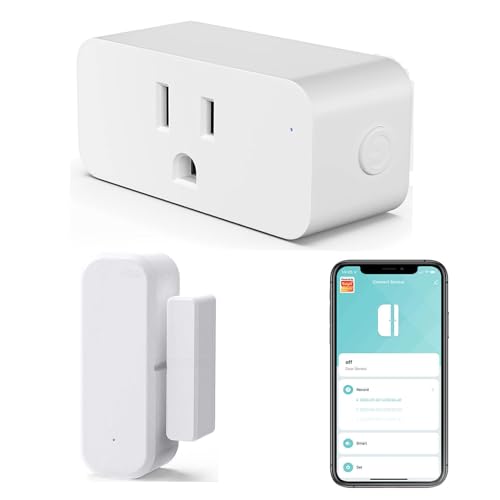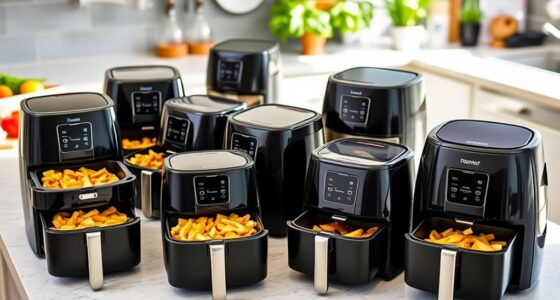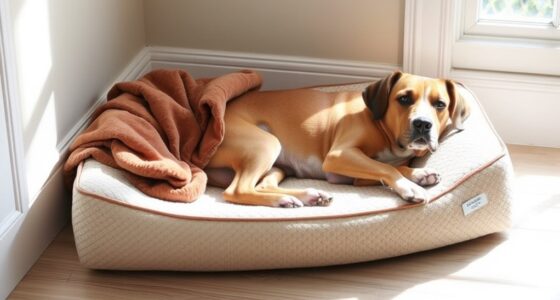If you’re looking to elevate your smart home, I recommend exploring the top 14 premium home automation hubs that support multiple protocols, offer local processing, and guarantee seamless device integration. These include hubs like Hubitat Elevation C-8, Homey Pro, and Samsung SmartThings, which cater to different needs and tech levels. Want to find out which one fits your setup perfectly and access the full potential of your smart home? Keep exploring to discover all the details.
Key Takeaways
- The list features top-tier automation hubs like Hubitat Elevation C-8, Homey Pro, and SmartThings 3rd Gen for advanced smart home control.
- These hubs support multiple protocols such as Zigbee, Z-Wave, Matter, and Wi-Fi, ensuring broad device compatibility.
- They offer powerful automation features, local processing, and customizable workflows to elevate smart home experiences.
- Each hub caters to different user needs, from tech-savvy enthusiasts to casual smart home users.
- The article highlights compatibility with specialized devices like smart lighting and energy monitoring systems for comprehensive automation.
Hubitat Elevation Home Automation Hub (Model C-8)
If you’re looking for a home automation hub that prioritizes speed, reliability, and privacy, the Hubitat Elevation Model C-8 is an excellent choice. It processes everything locally, so automations run instantly without cloud reliance. Supporting Zigbee, Z-Wave, Matter, and Wi-Fi via Ethernet, it’s compatible with over 1,000 devices across more than 100 brands, including Apple, Amazon, and Google. The hub allows seamless control of lights, locks, thermostats, and sensors. Its user-friendly app lets you manage devices remotely, while virtual devices and Siri shortcuts expand control options. Although setup can be complex, the performance benefits make it ideal for tech-savvy users seeking a reliable, fast home automation system.
Best For: tech-savvy home automation enthusiasts seeking a fast, reliable, and privacy-focused hub with extensive device compatibility and local processing.
Pros:
- Supports Zigbee, Z-Wave, Matter, and Wi-Fi protocols for broad device integration
- Processes automations locally for instant response and increased privacy
- Compatible with over 1,000 devices across 100+ brands, including major smart home ecosystems
Cons:
- Setup can be complex and may require technical knowledge and troubleshooting
- Stability issues, particularly with Z-Wave networks, may require frequent reboots
- User interface and initial learning curve can be challenging for beginners
Hubitat Elevation Home Automation Hub (Model C-8 Pro)
The Hubitat Elevation C-8 Pro stands out as an ideal choice for experienced smart home enthusiasts who want maximum control and customization. It supports over 1,000 devices from more than 100 brands, including Aqara, Philips Hue, and Nest, using protocols like Zigbee 3.0, Z-Wave 800, Wi-Fi, IR, and Matter. The hub processes data locally, ensuring faster responses, better reliability, and enhanced privacy without relying on cloud services. Its advanced automation features allow complex rules, custom dashboards, and integrations with voice assistants. While setup can be challenging, strong community support helps, making it perfect for power users seeking a versatile, highly customizable hub.
Best For: experienced smart home enthusiasts seeking maximum control, customization, and local processing capabilities.
Pros:
- Supports over 1,000 devices from more than 100 brands using multiple protocols like Zigbee 3.0, Z-Wave 800, Wi-Fi, IR, and Matter.
- Processes data locally for faster responses, increased reliability, and improved privacy without relying on cloud services.
- Offers advanced automation features, custom dashboards, and extensive integration options suitable for power users.
Cons:
- Setup can be complex and overwhelming for beginners; the interface has been criticized as regressive and less intuitive.
- Managing remote access may require paid plans, which can be a barrier for casual users.
- Firmware updates and troubleshooting may demand patience, especially when integrating older devices or resolving network issues.
Homey Pro Smart Home Hub for Home Automation
Homey Pro Smart Home Hub stands out for its extensive protocol support, making it an ideal choice for serious smart home enthusiasts who want to integrate a wide range of devices seamlessly. It supports Z-Wave Plus, Zigbee, Wi-Fi, BLE, Infrared, Matter, and Thread, working with over 50,000 devices from more than 1,000 brands, including Philips Hue, Sonos, Yale, and Ecobee. The hub processes automations locally, ensuring quick responses and privacy. Its intuitive Homey Flow system enables complex routines without coding. While some users report stability issues or compatibility gaps, overall, it offers robust automation and device integration for a premium smart home experience.
Best For: serious smart home enthusiasts seeking comprehensive device integration, local automation processing, and support for multiple protocols in a premium hub.
Pros:
- Supports a wide range of protocols including Z-Wave Plus, Zigbee, Wi-Fi, BLE, Infrared, Matter, and Thread, ensuring extensive device compatibility.
- Processes automations locally for fast response times and enhanced privacy, even during internet outages.
- User-friendly Homey Flow system allows for complex routines without requiring coding knowledge.
Cons:
- Some users experience stability issues or delays, particularly with Z-Wave devices or Wi-Fi connections.
- Compatibility gaps with certain brands or devices, especially in North America, can limit functionality.
- Lacks an Ethernet port, necessitating optional adapters for wired connections, which can be inconvenient given its price.
Homey Bridge Smart Home Hub for Home Automation
For those seeking a versatile smart home hub that supports multiple protocols like Z-Wave Plus, Zigbee, Wi-Fi, BLE, and Infrared, the Homey Bridge stands out as a compelling option. It integrates with popular voice assistants such as Alexa, Google Home, and Siri Shortcuts (sold separately), allowing voice control of various devices. The hub connects with thousands of brands, including Philips Hue, Sonos, Nest, and Yale. Setup is straightforward, but some users face challenges with device recognition and network stability. While it offers automation flows and device grouping, mixed reviews highlight connectivity issues and a somewhat clunky app interface, making it worth pondering your device compatibility carefully.
Best For: those looking for a versatile smart home hub supporting multiple protocols and integrating with major voice assistants, despite potential connectivity issues.
Pros:
- Supports a wide range of protocols including Z-Wave Plus, Zigbee, Wi-Fi, BLE, and Infrared for comprehensive device compatibility
- Integrates with popular voice assistants like Alexa, Google Home, and Siri Shortcuts for voice control
- Allows for automation flows, device grouping, and customization within the app
Cons:
- Users report frequent connectivity problems and device dropouts, especially with certain devices like locks and thermostats
- The app interface can be clunky and unintuitive, affecting ease of setup and user experience
- Some devices may not be recognized properly or work reliably, leading to limited support for certain smart products
SmartThings Hub 3rd Generation Smart Home Automation Hub
If you’re looking for a versatile hub that seamlessly connects a wide range of smart devices, the Samsung SmartThings Hub 3rd Generation stands out as an excellent choice. It supports protocols like Zigbee, Z-Wave, Wi-Fi, and Ethernet, ensuring broad compatibility with sensors, switches, and security devices. Easy to set up in just 15 minutes, it’s controlled via the intuitive SmartThings app and integrates with Alexa and Google Assistant. Compact and battery-powered, it features a 720p night vision camera with motion alerts. Its reliability, multi-device automation capabilities, and regional adaptability make it a top premium option for elevating your smart home experience.
Best For: those seeking a versatile, easy-to-setup smart home hub compatible with multiple protocols and voice assistants for enhanced automation and security.
Pros:
- Supports multiple protocols including Zigbee, Z-Wave, Wi-Fi, and Ethernet for broad device compatibility
- Quick and straightforward setup within 15 minutes with user-friendly app control
- Compact, battery-powered design with integrated 720p night vision camera and motion alerts
Cons:
- Occasional connectivity issues with sensors requiring troubleshooting or resets
- Small reset pinhole may be difficult to locate on some sensors
- Availability and initial setup can be challenging outside certain regions or with firmware updates
Philips Hue Bridge, Smart Lighting Hub for Automations
The Philips Hue Bridge stands out as the ideal choice for anyone seeking seamless smart lighting automation. It includes a hub that unlocks full system capabilities like automations, remote control, and multi-room setups. Using Zigbee technology, it offers a secure, stable connection without overloading your Wi-Fi, supporting up to 50 lights and accessories. It’s also compatible with Matter, enabling integration with other smart home devices. You can control your lights from anywhere with the Hue app, and create automations, zones, or sync lighting to content for movies, music, or gaming. Plus, automatic updates keep the system current for future smart home innovations.
Best For: smart home enthusiasts seeking reliable, customizable, and scalable lighting automation with remote control and seamless integration capabilities.
Pros:
- Supports up to 50 lights and accessories, ideal for various home sizes and setups.
- Uses Zigbee technology for a secure and stable connection without Wi-Fi interference.
- Compatible with Matter, enabling integration with a wide range of smart home devices.
Cons:
- Requires a Hue Bridge for full functionality, adding an extra device and cost.
- Limited to 50 lights and accessories, which may be insufficient for very large or complex systems.
- Content syncing features for movies, music, and gaming require additional accessories like the HDMI Sync Box.
Emporia Vue 3 Home Energy Monitor
Emporia Vue 3 Home Energy Monitor stands out as an excellent choice for homeowners who want detailed, real-time insights into their energy consumption. It’s UL Listed and CE Certified, ensuring safety and reliability. Installation is straightforward, using clamp-on sensors compatible with various home electrical systems. It tracks up to 16 circuits, including solar production and net metering, with ±2% accuracy. The system provides continuous data via WiFi, allowing me to monitor energy use remotely through an app. With its granular insights, I can optimize appliance operation, reduce costs, and identify savings opportunities—making it a powerful tool for smarter energy management.
Best For: homeowners seeking detailed, real-time energy monitoring and cost-saving insights through a reliable, easy-to-install system.
Pros:
- Supports monitoring up to 16 circuits, including solar production and net metering for comprehensive energy tracking
- Supports various electrical systems (single-phase, split-phase, 3-phase, 4-wire Wye) with clamp-on sensors for easy installation
- Provides accurate (±2%) real-time data accessible remotely via WiFi app for effective energy management
Cons:
- Installation requires some electrical familiarity, especially clipping sensors onto breakers and trimming wires
- Limited to a 2.4 GHz WiFi network, which may affect connectivity in some homes
- Slightly constrained panel space might limit sensor placement or expansion options
For homeowners seeking seamless control over their smart devices, the arre Smart Button stands out thanks to its Matter and Thread support, ensuring reliable and fast communication across leading ecosystems. It works effortlessly with Apple HomeKit and Samsung SmartThings, making integration simple. Its Thread capability provides low-latency, robust connectivity, especially when paired with a Thread Border Route. The button offers versatile control with single, double, and long-press actions, letting you customize your smart home experience. Plus, its decorative sticker pack, including glow-in-the-dark options, adds a personal touch. Overall, it’s a sleek, functional device that enhances your smart home’s convenience and interoperability.
Best For: homeowners and smart home enthusiasts seeking reliable, fast, and customizable control of their smart devices across multiple ecosystems with seamless interoperability.
Pros:
- Supports Matter and Thread for robust and low-latency device communication
- Compatible with Apple HomeKit and Samsung SmartThings for versatile ecosystem integration
- Includes customizable decorative stickers, including glow-in-the-dark options, for personal personalization
Cons:
- Requires a Thread Border Route for Thread connectivity, which may add setup complexity
- Limited to three press actions (single, double, long press), which may restrict advanced control options
- Dependence on compatible smart home ecosystems means full functionality may vary with other platforms
SONOFF Zigbee 3.0 USB Dongle Plus Gateway
If you’re looking for a reliable Zigbee hub to enhance your home automation setup, the SONOFF Zigbee 3.0 USB Dongle Plus Gateway stands out as a top choice. It features pre-flashed Z-Stack 3.x.0 firmware on a TI CC2652P chipset, ensuring robust performance. The external SMA antenna interface and aluminum housing help minimize signal interference, boosting connectivity stability. Compatible with platforms like Home Assistant and Zigbee2MQTT, it offers flexible integration options. Installation is straightforward, with detailed tutorials available via QR code. This USB dongle delivers dependable Zigbee connectivity, making it an excellent addition to any smart home ecosystem.
Best For: home automation enthusiasts seeking a reliable, easy-to-integrate Zigbee hub compatible with popular platforms like Home Assistant and Zigbee2MQTT.
Pros:
- Supports Zigbee 3.0 protocol with pre-flashed Z-Stack 3.x.0 firmware for seamless operation
- External SMA antenna interface and aluminum housing reduce signal interference and improve connectivity stability
- Compatible with multiple smart home platforms, offering flexible integration options
Cons:
- Requires technical knowledge for setup, especially for beginners unfamiliar with Zigbee networks
- Limited to a single USB connection, which may impact placement flexibility in some setups
- May need additional accessories, such as antennas, for optimal performance in large or complex environments
SofaBaton X1S Universal Remote with Hub and App
The SofaBaton X1S Universal Remote with Hub and App stands out as an ideal choice for tech-savvy homeowners seeking a streamlined, all-in-one control solution. It supports over 6,000 brands and 500,000 device models, ensuring broad compatibility with current and future gadgets through a constantly updated database. The remote manages IR, Bluetooth, and WiFi devices, with a powerful hub that provides 360-degree control and eliminates blind spots. Its backlit buttons, LCD screen, and voice control via Alexa or Google Assistant make daily operation easy. While setup can be complex, once configured, it offers extensive customization, macros, and seamless device management, elevating your smart home experience.
Best For: tech-savvy homeowners seeking a comprehensive, customizable universal remote with smart home integration and extensive device compatibility.
Pros:
- Controls over 6,000 brands and 500,000 device models, ensuring broad compatibility
- Features a powerful hub with 360-degree control and dual IR blasters for reliable signal coverage
- Supports voice commands via Alexa and Google Assistant for hands-free operation
Cons:
- Setup process can be complex and challenging for less tech-savvy users
- Limited Bluetooth device support and occasional app stability issues
- Premium pricing may be prohibitive for some consumers
Kasa Smart Plug HS103P4, Wi-Fi Outlet 4-Pack
The Kasa Smart Plug HS103P4 4-pack stands out as an excellent choice for anyone seeking reliable, easy-to-use home automation in multiple rooms or outdoor spaces. I appreciate how simple setup is—just plug in, connect to Wi-Fi, and follow the app instructions. The plugs work seamlessly with Alexa, Google Assistant, and SmartThings, offering instant voice control. Their compact, weather-resistant design makes them perfect for outdoor use, and with a 15 Amp capacity, they handle various devices safely. I find it reassuring that schedules stay active even during internet outages, ensuring my automation routines run smoothly, whether I’m home or away.
Best For: homeowners and outdoor enthusiasts seeking reliable, easy-to-install smart plugs for indoor and outdoor automation needs.
Pros:
- Easy setup with quick Wi-Fi connection and app instructions
- Compatible with Alexa, Google Assistant, and SmartThings for seamless voice control
- Weather-resistant design suitable for outdoor use and high-load devices
Cons:
- Minor indicator lights during setup may be distracting to some users
- Physical buttons provide manual control, but may be less intuitive for some users
- Limited to 15 Amp capacity, which may not suit very high-power appliances
REOLINK Home Hub, Home Security System
Looking for a home security system that combines centralized control with expandable storage? The Reolink Home Hub is exactly that. It manages multiple cameras, supports up to eight, and securely stores footage on a microSD card with room for up to 1TB of extra storage. The hub consolidates alerts, recordings, and alarms, providing easy daily or weekly summaries. It supports high-quality video up to 16MP via Wi-Fi 6, ensuring reliable connectivity. Plus, it prioritizes privacy with AES128 encryption and doesn’t require monthly fees. This all-in-one system offers robust security, flexible storage, and seamless management for a smarter, safer home.
Best For: homeowners seeking an all-in-one, expandable security system with centralized management, high-quality video, and strong privacy protection.
Pros:
- Supports up to 8 cameras with customizable security setup
- Secure local storage with expandable options up to 1TB microSD card
- High-quality video recording up to 16MP with Wi-Fi 6 connectivity
Cons:
- Limited to Reolink-compatible cameras and doorbells
- No monthly subscription fees but may require manual setup for expansion
- Lacks advanced features like facial recognition or AI-powered analytics
Aqara Smart Lock U100, Keyless Entry Door Lock with Fingerprint and Apple Home Key
If you want a smart lock that combines advanced security with seamless integration into your Apple ecosystem, the Aqara Smart Lock U100 is an excellent choice. It supports Apple Home Key, allowing you to release your door with your iPhone or Apple Watch—even if the device is powered off. You can also manage access via the Apple Home app and automate the lock with other smart devices. With multiple unlocking options like fingerprints, remote passwords, and a mechanical key, plus AES encryption for security, this lock offers convenience and peace of mind. Its durable zinc alloy body and weatherproof design make it suitable for any environment.
Best For: homeowners and smart home enthusiasts seeking a highly secure, Apple ecosystem-compatible keyless lock with multiple unlocking options and weatherproof durability.
Pros:
- Fully integrates with Apple Home and supports Apple Home Key for effortless unlocking even when device is off
- Multiple unlocking methods including fingerprints, remote passwords, mechanical key, and NFC card support (sold separately)
- Durable construction with zinc alloy body and IP65 weatherproof rating suitable for various environments
Cons:
- Requires a Zigbee 3.0 hub for remote password management and some automation features
- Battery life of up to 8 months may necessitate periodic replacements or emergency charging
- NFC card support is sold separately, adding extra cost for full functionality
SOLO Smart WiFi Door/Window Sensor with App Notifications
For homeowners seeking reliable security alerts without the hassle of a hub, the SOLO Smart WiFi Door/Window Sensor stands out as an excellent choice. It sends instant app notifications via Smartlife, compatible with Alexa and Google Home, making setup simple and straightforward. The sensor detects door or window activity and offers scene automation, controlling smart plugs and devices. Its compact design, durable build, and outdoor suitability guarantee long-lasting performance. Powered by two AAA batteries, it provides a maximum range of 300 feet. With event history and battery status accessible through the app, it’s a dependable tool to enhance your home security effortlessly.
Best For: homeowners seeking an easy-to-install, reliable WiFi door/window sensor that offers instant notifications and compatibility with popular smart home platforms without needing a hub.
Pros:
- No hub required, simplifying installation and setup
- Compatible with Alexa and Google Home for voice control
- Offers real-time alerts, event history, and scene automation via Smartlife app
Cons:
- Requires 2 AAA batteries, which are not included
- Limited to WiFi range of 300 feet, potentially affecting outdoor use in large properties
- Basic sensor design may lack advanced features found in more expensive models
Factors to Consider When Choosing Premium Home Automation Hubs
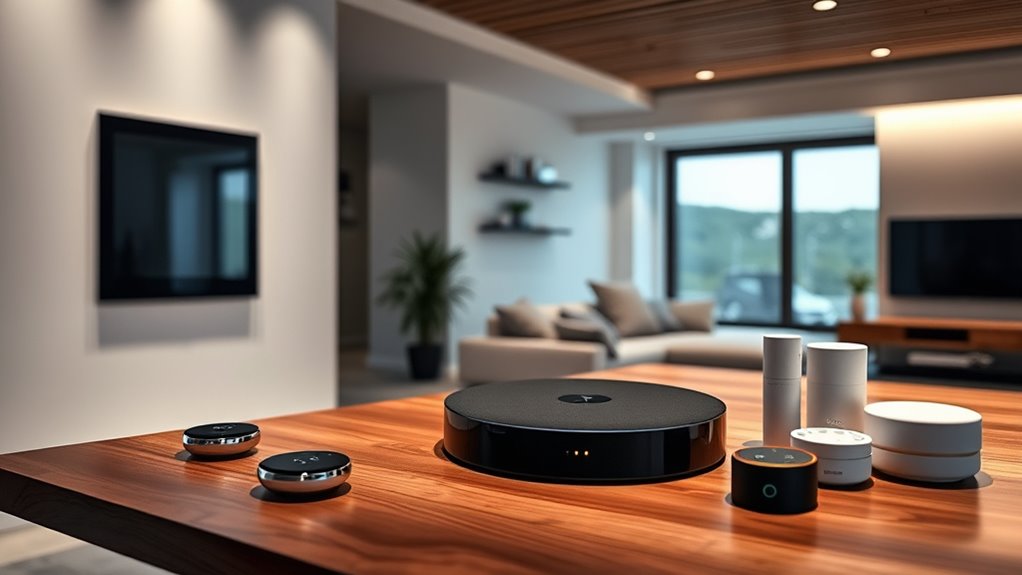
When choosing a premium home automation hub, I consider factors like protocol compatibility, device ecosystem support, and processing speed to guarantee smooth operation. It’s also important to evaluate how flexible the automation options are and how complex the setup process might be. These points help me find a hub that fits my needs without unnecessary hassle.
Protocol Compatibility Range
Choosing a premium home automation hub means paying close attention to its protocol compatibility range, as this determines which devices it can reliably connect and control. A versatile hub supports multiple protocols like Zigbee, Z-Wave, Matter, Wi-Fi, IR, and BLE, ensuring broad device compatibility. This variety allows for seamless integration across different brands and ecosystems, expanding your system’s capabilities. The protocol range also affects how many devices can be connected and controlled within your network, impacting scalability. Additionally, support for both local communication and cloud integration influences response times and automation reliability. Physical and wireless ranges of protocols like Zigbee and Z-Wave are essential, as they determine how far devices can be placed from the hub without connectivity issues. Supporting emerging standards like Matter can future-proof your smart home.
Local Processing Speed
The speed at which a home automation hub processes commands directly impacts your smart home’s responsiveness. Faster local processing means automations execute quickly, with minimal delay, even without internet. This reduces latency, so device responses feel instant, improving your overall experience. A hub with optimized CPU and ample memory can handle complex rules and multiple commands simultaneously, ensuring smooth performance. Relying less on cloud processing minimizes delays caused by network issues or outages, making your system more reliable. Efficient processing capabilities are especially important during internet disruptions, maintaining real-time control and automation. When choosing a premium hub, prioritize those with robust local processing power to ensure your smart home remains responsive, seamless, and dependable at all times.
Device Ecosystem Support
Supporting a wide range of smart home protocols like Zigbee, Z-Wave, Matter, and Wi-Fi is vital for maximizing device compatibility. I look for hubs that support my preferred protocols to guarantee I can connect all my devices seamlessly. Compatibility with ecosystems like Apple HomeKit, Amazon Alexa, Google Home, or Samsung SmartThings is also essential for smooth integration. I verify if the hub can handle various device types—sensors, locks, lights, thermostats, security cameras—to build a thorough smart home. Additionally, support for third-party platforms via APIs or community solutions helps expand device options. With emerging standards like Matter gaining ground, I prioritize hubs that support these to future-proof my setup and enjoy better interoperability across brands.
Automation Flexibility
When evaluating premium home automation hubs, automation flexibility stands out as a key factor because it determines how effortlessly I can customize and expand my smart home system. A versatile hub supports multiple protocols like Zigbee, Z-Wave, Matter, and Wi-Fi, making it easier to integrate various devices from different brands. I look for hubs that allow customizable automation rules, including complex “if-this-then-that” logic, which lets me create tailored routines without coding. Virtual devices and switches help overcome native device limitations, opening up more control options. Integration with third-party apps and platforms offers endless possibilities for personalized workflows. Support for virtual triggers, conditionals, and multi-step routines makes my automation setup more adaptable to evolving needs, ensuring my smart home remains flexible and future-proof.
Setup Complexity Level
Choosing the right home automation hub involves considering how easy or complicated the setup process will be. If the setup is overly complex, you might need advanced technical skills, like configuring networks or pairing devices, which can be time-consuming and frustrating—especially for beginners. A confusing user interface or frequent bugs can make initial setup and ongoing management harder, leading to headaches. Multiple steps, firmware updates, and manual configuration of protocols like Z-Wave or Zigbee can prolong the process and cause troubleshooting issues. Devices that require extra hardware, like border routers or repeaters, add layers of complexity that might complicate installation and affect network stability. Ideally, look for a hub with a straightforward, guided setup and clear instructions—they make deployment faster and less stressful.
Stability and Reliability
Stability and dependability are critical factors when selecting a premium home automation hub because they guarantee your smart devices work seamlessly without frequent disruptions. A reliable hub maintains stable connections across protocols like Zigbee, Z-Wave, Wi-Fi, Thread, and Matter, preventing device dropouts and ensuring smooth operation. Using wired Ethernet for high-traffic or critical devices enhances stability by reducing interference and latency common with wireless connections. Regular firmware updates and proper network setup are essential to fix bugs and improve system performance over time. A robust hub minimizes the need for reboots by effectively managing device polling and network traffic. Compatibility with a broad range of devices, along with proactive error handling and diagnostics, further ensures long-term reliability and peace of mind in your smart home.
Privacy and Data Security
Reliability in a home automation hub isn’t just about steady connections; it also hinges on how well it protects your privacy and secures your data. Premium hubs focus on local data processing, reducing reliance on cloud services and minimizing exposure to breaches. They use strong encryption standards like AES-128 to safeguard stored and transmitted information. Support for secure protocols such as Zigbee, Z-Wave, and Matter encrypts device communications, making interception much harder. These hubs often include user access controls, device authentication, and regular firmware updates to patch vulnerabilities. Importantly, privacy-focused hubs avoid data mining and sharing activity data with third parties, ensuring your personal information remains confidential. When choosing a premium hub, prioritizing these security features is essential to keep your smart home safe and private.
Integration Ease
When selecting a premium home automation hub, seamless integration across devices and platforms is essential. I look for hubs that support multiple protocols like Zigbee, Z-Wave, Matter, and Wi-Fi to guarantee compatibility with a wide range of smart devices. Compatibility with ecosystems such as Apple HomeKit, Amazon Alexa, and Google Home makes controlling and automating devices straightforward. An easy setup and quick device pairing process are crucial, especially if you’re not tech-savvy, as they save time and reduce frustration. Additionally, support for virtual devices and custom integrations opens up advanced automation possibilities. Firmware and software updates that enhance compatibility and introduce new features are imperative for maintaining smooth operation over time. Overall, integration ease considerably impacts the user experience and ecosystem flexibility.
Frequently Asked Questions
How Do Premium Hubs Integrate With Existing Smart Home Ecosystems?
Premium hubs seamlessly integrate with existing smart home ecosystems by supporting multiple protocols like Z-Wave, Zigbee, and Wi-Fi. I connect my devices through the hub’s app, which centralizes control and automation. It acts as a bridge, allowing different brands and devices to communicate effortlessly. I appreciate how these hubs expand my system’s capabilities, making it easier to customize and manage my smart home without compatibility worries.
What Security Features Are Standard in High-End Home Automation Hubs?
Think of it as locking all the doors before bed—I prioritize security. High-end home automation hubs come standard with advanced encryption, multi-factor authentication, and secure firmware updates. Many also feature intrusion detection and remote access controls. These security features act like a digital fortress, ensuring my smart home stays safe from hacking attempts and unauthorized access, giving me peace of mind knowing my devices and data are well protected.
Can These Hubs Support Future Smart Device Updates?
Yes, these hubs are built to support future smart device updates. I’ve found that premium hubs often feature regular firmware updates, compatibility with new devices, and open APIs that allow seamless integration. This means I don’t have to worry about my system becoming outdated quickly. They’re designed to evolve with technology, ensuring I can add new gadgets and features without hassle, keeping my smart home future-proof.
How Do Premium Hubs Handle Network Congestion and Latency Issues?
Think of a premium hub as a skilled traffic controller, smoothly directing data through busy intersections. These hubs handle network congestion and latency with advanced prioritization algorithms and robust processing power, ensuring your devices communicate seamlessly. They often support wired and wireless connections, reduce bottlenecks, and optimize data flow. As a result, your smart home stays responsive, even during peak usage, making the experience effortless and reliable.
Are There Customizable Options for Advanced Automation Scenarios?
Yes, premium hubs often offer customizable options for advanced automation scenarios. I love how I can tailor routines, set complex triggers, and integrate multiple devices seamlessly. These hubs usually come with user-friendly interfaces or even scripting capabilities, so I can create unique, personalized experiences. Whether it’s custom lighting scenes, security protocols, or multi-device interactions, I feel empowered to make my smart home truly reflect my lifestyle and preferences.
Conclusion
Ultimately, choosing a premium home automation hub isn’t just about features; it’s about finding a trusted companion that quietly enhances your space. While no system is perfect, the right hub gently guides your smart home journey, blending seamlessly into your lifestyle. With a bit of patience and careful consideration, you’ll discover the perfect match that enriches your daily routines, making your home feel more intuitive and warmly connected without ever feeling overwhelmed.
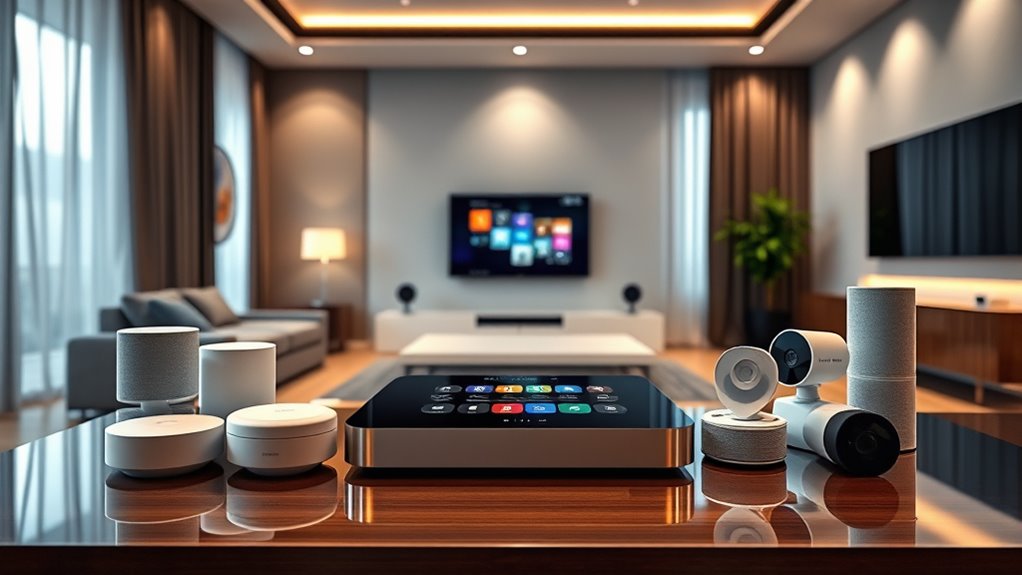






![SmartThings Hub 3rd Generation [GP-U999SJVLGDA] Smart Home Automation Hub Home](https://m.media-amazon.com/images/I/21hChu0ounL._SL500_.jpg)








